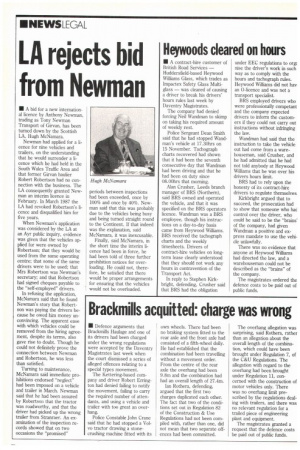Heywoods cleared on hours
Page 22

If you've noticed an error in this article please click here to report it so we can fix it.
• A contract-hire customer of British Road Services — Huddersfield-based Heywood Williams Glass, which trades as lmpactex Safety Glass Multiglass — was cleared of causing a driver to break his drivers' hours rules last week by Daventry Magistrates.
The company had denied forcing Neil Wandman to skimp on taking his required amount of weekly rest.
Police Sergeant Dean Smith said that he had stopped Wandman's vehicle at 17.30hrs on 15 November. Tachograph charts recovered had shown that it had been the seventh consecutive day that Wandman had been driving and that he had been on duty since 08.00hrs that morning.
Alan Crusher, Leeds branch manager of BRS (Northern), said BRS owned and operated the vehicle, and that it was specified on the BRS operators licence. Wandman was a BRS employee, though his instructions on a day-to-day basis came from Heywood Williams. BRS received the tachograph charts and the weekly timesheets. Drivers of contract-hire vehicles on longterm lease clearly understood that they should not work any hours in contravention of the Transport Act.
In reply to Stephen Kirkbright, defending, Crusher said that BRS had the obligation under EEC regulations to org nise the driver's work in such way as to comply with the hours and tachograph rules. Heywood Williams did not hay an 0-licence and was not a transport specialist.
BRS employed drivers who were professionally competant and the company expected drivers to inform the customers if they could not carry out instructions without infringing the law.
Wandman had said that the instruction to take the vehicle out had come from a warehouseman, said Crusher, and he had admitted that he had not told anybody at Heywood Williams that he was over his drivers hours limit.
BRS had to rely upon the honesty of its contract-hire drivers to regulate themselves.
Kirkbright argued that to succeed, the prosecution had to show that someone who hac control over the driver, who could be said to be the "brains' of the company, had given Wandman a positive and express mandate to use the vehicle unlawfully.
There was no evidence that anyone at Heywood Williams had directed the law, and a warehouseman could not be described as the "brains" of the company.
The magistrates ordered the defence costs to be paid out of public funds.














































